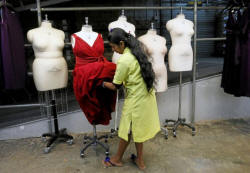|
The
South Asian island nation lost the concession six years ago.
The trade concession offered by the Generalised Scheme of
Preferences (GSP) Plus will provide immediate benefits worth in
excess of 300 million euros a year and the value could be worth
many times more if Sri Lanka uses the opportunity to diversify
its economy, the European Union said in a statement.
The trade concession will see the European Union removing a
significant part of import duties on select products in exchange
for a commitment to ratify and effectively implement 27
international conventions on human rights, labor conditions,
protection of the environment and good governance, it said.
"...no one is pretending that the situation is perfect," EU
Trade Commissioner Cecilia Malmström said in a statement. "The
EU will work closely with the government and non-government
organizations to rigorously monitor progress."
The EU said the process of replacing a prevention of terrorism
act still needs to be completed, incidents of torture still
remain and children are still being forced into marriage, while
there are still laws that discriminate against sections of
society.
"We want to see an end to these practices," Malmström said.
Sri Lanka lost the EU concession in 2010 after then-president
Mahinda Rajapaksa rejected demands from the international
community to address human rights abuses allegedly committed
during a 2009 offensive to crush a Tamil insurgency.
Since ousting Rajapaksa in January 2015, President Maithripala
Sirisena's administration has agreed to address the rights
violations.
With annual exports of around $5 billion, Sri Lanka produces
garments for some of the world's most popular brands.
(Reporting by Shihar Aneez; Editing by Nick Macfie)
[© 2017 Thomson Reuters. All rights
reserved.] Copyright 2017 Reuters. All rights reserved. This material may not be published,
broadcast, rewritten or redistributed.
 |
|




